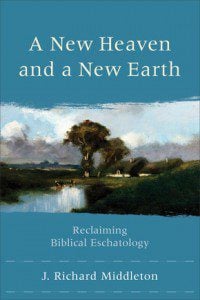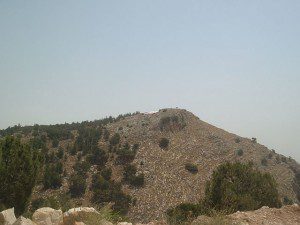 This is the last of a series of posts on Richard Middleton’s book A New Heaven and a New Earth. His argument thus far has been that Scripture teaches a holistic redemption of creation. The biblical Christian hope is not for some disembodied heavenly hereafter but for a material existence in a redeemed and consummated creation. This Christian hope has consequences for the gospel message and for the now and future kingdom of God. To develop the ethic of the kingdom of God, Middleton turns to the Gospel of Luke (with references to other NT passages included as well).
This is the last of a series of posts on Richard Middleton’s book A New Heaven and a New Earth. His argument thus far has been that Scripture teaches a holistic redemption of creation. The biblical Christian hope is not for some disembodied heavenly hereafter but for a material existence in a redeemed and consummated creation. This Christian hope has consequences for the gospel message and for the now and future kingdom of God. To develop the ethic of the kingdom of God, Middleton turns to the Gospel of Luke (with references to other NT passages included as well).
Jesus opens his ministry in Nazareth reading a passage from the book of Isaiah, actually sections of a couple of passages, 61:1-2 and 58:6. (Luke 4:16-22)
He went to Nazareth, where he had been brought up, and on the Sabbath day he went into the synagogue, as was his custom. He stood up to read, and the scroll of the prophet Isaiah was handed to him. Unrolling it, he found the place where it is written:
“The Spirit of the Lord is on me,
because he has anointed me
to proclaim good news to the poor.
He has sent me to proclaim freedom for the prisoners
and recovery of sight for the blind,
to set the oppressed free,
to proclaim the year of the Lord’s favor.”
Then he rolled up the scroll, gave it back to the attendant and sat down. The eyes of everyone in the synagogue were fastened on him. He began by saying to them, “Today this scripture is fulfilled in your hearing.”
All spoke well of him and were amazed at the gracious words that came from his lips. “Isn’t this Joseph’s son?” they asked.
This is an important inaugural passage; it sets the stage for Jesus earthly mission. Middleton notes “it has been the tendency of Christian interpreters through the ages … to assume that this text in Luke 4:18-19 is referring primarily, if not exclusively, to so-called spiritual matters.” But this is not the context of Isaiah or of the Gospels. An other-worldly dualism “prevents many who read this text from taking Jesus’s claims with the full force with which they were intended.” (p. 251) This really is good news for the poor, the captive, the oppressed. The year of Jubilee (the Lord’s favor) is come.
Middleton digs into the context of Isaiah, and of first century Judea to understand the intent of Jesus in this quotation. A similar hope for rescue and restoration is expressed in the Dead Sea Scrolls, esp. the Messianic Apocalypse. “This is not to say that Jesus (or Luke) is explicitly citing the Messianic Apocalypse. Rather these ideas were simply a part of the messianic expectation of the time.” (p. 260) This context is also apparent in other passages. In Luke 7:11-15, for example, Jesus raises a man from the dead and restores him to his mother. In awe the people exclaim that “God has come to help his people.” The people can see that the kingdom of God is at hand.
The people of Nazareth ate up his words in this part of the message and responded favorably. This is truly good news – for them and for us.
The good news is that the coming of God’s kingdom impacts the entirety of our lives – our bodies, our work, our families, all our social relationships, even our relationship to the earth itself. The good news of the kingdom is nothing less than the healing (literally the establishing) of the world (tikkûm ‘ôlām), in which we are all invited to participate. (p. 262)
But the passage – and indeed the good news – doesn’t end on this high note.
The Challenge of the Kingdom. Immediately after filling us in on the positive response of the crowd, Luke continues the story (v. 23-30):
Jesus said to them, “Surely you will quote this proverb to me: ‘Physician, heal yourself!’ And you will tell me, ‘Do here in your hometown what we have heard that you did in Capernaum.’”
“Truly I tell you,” he continued, “no prophet is accepted in his hometown. I assure you that there were many widows in Israel in Elijah’s time, when the sky was shut for three and a half years and there was a severe famine throughout the land. Yet Elijah was not sent to any of them, but to a widow in Zarephath in the region of Sidon. And there were many in Israel with leprosy in the time of Elisha the prophet, yet not one of them was cleansed—only Naaman the Syrian.”
All the people in the synagogue were furious when they heard this. They got up, drove him out of the town, and took him to the brow of the hill on which the town was built, in order to throw him off the cliff. But he walked right through the crowd and went on his way.
 The impact of this was great – often passes over our heads today. Neither the widow nor Naaman were Jews. The year of the Lord’s favor is for all. Middleton summarizes:
The impact of this was great – often passes over our heads today. Neither the widow nor Naaman were Jews. The year of the Lord’s favor is for all. Middleton summarizes:
By these examples, Jesus clearly intends to have his listeners understand that the kingdom of God breaks down the opposition between Jew and gentile that had been hardening among many first-century Jews into an unbridgeable gulf. And since his two examples involve a poor woman and a powerful man, Jesus effectively dismantles the male/female hierarchy and the distinction between rich and poor or privileged and marginal. All people, of whatever ethnicity, gender, or social status, can be recipients of God’s grace. God plays no favorites. (p. 265)
A receptive attitude is the only requirement.
Middleton also considers the passage with John the Baptist. While in prison he sends his disciples to Jesus:
When the men came to Jesus, they said, “John the Baptist sent us to you to ask, ‘Are you the one who is to come, or should we expect someone else?’”
At that very time Jesus cured many who had diseases, sicknesses and evil spirits, and gave sight to many who were blind. So he replied to the messengers, “Go back and report to John what you have seen and heard: The blind receive sight, the lame walk, those who have leprosy are cleansed, the deaf hear, the dead are raised, and the good news is proclaimed to the poor. Blessed is anyone who does not stumble on account of me.”
John died in prison (not to mention the many martyred Christians in the early church). Middleton points out that this should caution us against a health, wealth, and prosperity gospel. Nonetheless, the kingdom of God brings real healing.
The coming of the kingdom meant (and means) nothing less than the restoration of our earthly life to the fullness of God’s original intentions for blessing, shalom, and justice in the earth (and that certainly includes the liberation of those unjustly imprisoned). What John did not understand was that the kingdom does not come all at once. John was in danger of stumbling over Jesus on this point. He expected too much too quickly.
Historically, however, many Christians have had the opposite problem. We have not expected enough. And what we have expected, we have often delayed until “heaven” and the return of Christ. We have not really believed that God cares about this world of real people in their actual historical situations, which are often characterized by oppression and suffering. Our understanding of salvation has been characterized by an unbiblical otherworldliness. So our expectations of the future have often not reflected the full-robed good news that Jesus proclaimed at Nazareth. (p. 271)
No favorites. The ethical implication is clear, if God plays no favorites neither should we. If the year of the Lord’s favor includes healing, release, provision, and protection, we too should care for healing, release, and provision for all.
Middleton puts it this way: “the kingdom of God is not coterminous with the church or with any nation or any set of cultural ideals; rather it refers to God’s restorative rule over the entire earth.” (p. 273) He makes the point that the good news should be for all, and that the church should take up the challenge to mediate the this-worldly blessing of God to all. We could quibble with the way Middleton expresses this. Scot has argued that the kingdom is the people of God, and thus is the church. But on a practical level the end result is the same for the most part, as long as we don’t use the kingdom as the church to exclude others and limit the good to those who are on the insider, or use the kingdom as restorative rule to minimize the importance of the church as God’s people. For God’s people there is no separation of secular and sacred; we only do God’s work as God’s people. (Or at least this is my reading.)
In North America today, rather than a Sidonian widow and a Syrian man, Jesus might note that God came to the immigrant, the refugee, the welfare recipient.
Suppose Jesus said to an American congregation in a state bordering Mexico “There were many middle-class American citizens living in California who lost their homes due to the housing crisis and the stock market crash, but God was pleased to provide an illegal Mexican worker in Santa Fe with housing and health care for his family.” (p. 280)
This is the impact of the statement Jesus made in Nazareth. And the lesson is for us today as well. (Perhaps we could expand it to Syrian refugees this year.) It raised the ire of the people of Nazareth as it raises the ire of so many today. The gospel upends social hierarchy, it demolished the barriers between us and them (whoever “us” and “them” are). There is no Jew or Greek, no male or female, no slave or free. Mutual submission, servant leadership, and care for all is to be the way of God’s kingdom on earth. Now and in the age to come.
This is good news for all.
How does our understanding of Christian hope for the future influence our life and choices today?
Does Middleton’s view of a holistic reconciliation and its impact on Christian ethics make sense?
Does Middleton’s rephrasing of Luke 4:25-27 in terms of a Mexican immigrant change your view of this passage?
If you wish to contact me directly you may do so at rjs4mail[at]att.net.
If interested you can subscribe to a full text feed of my posts at Musings on Science and Theology.











